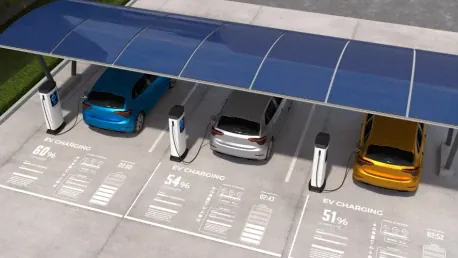The relationship between China and the European Union (EU) in the electric vehicle (EV) sector is increasingly pivotal, given their mutual goals of fostering a global green economy. With China’s rapid advancements in battery technology and the EU’s desire to boost its local supply chains for green technologies, there is a golden opportunity for both regions to collaborate. However, the EU’s struggle to keep pace with China’s technical achievements has led to calls for regulatory frameworks aimed at securing technology and skill transfers. These appeals underscore the EU’s concerns over the resilience of its EV supply chain, punctuated by recent setbacks involving key industry players like Northvolt, a significant name in the European battery market, whose collapse has illustrated the vulnerabilities of relying solely on domestic capabilities.
At the same time, Chinese companies have managed to navigate the EV landscape with remarkable agility, bolstered by economies of scale and continuous innovation. This has created a stark contrast with the EU, highlighting the dynamic between competition and collaboration in the China-EU context. Despite disparities, both entities recognize the value of open dialogue and consultation, as evidenced by continuous communication between officials and industry leaders on both sides. Recently, Chinese Minister of Commerce Wang Wentao, in discussions with the president of the European Automobile Manufacturers’ Association and the chairman of Mercedes-Benz, underscored the importance of resolving the EU’s anti-subsidy investigation into Chinese EVs. Wang’s optimism that key stakeholders will advocate for a favorable decision from the European Commission suggests that both regions are keen on finding a balanced approach that benefits them mutually.
Embracing Mutual Benefits and Innovating Together
China’s approach to the EV sector, characterized by openness and collaboration, is geared towards achieving mutual benefits and shared advancement. A collaborative mindset between China and the EU could accelerate green transformations within their respective industries and add dynamism to global green transportation efforts. While China excels in battery technology and maintains cost efficiency, the EU brings strong brand influence and market credibility, making their potential cooperation incredibly advantageous for both sides. The synergy between these distinct yet complementary strengths can drive innovations that neither could achieve as effectively alone.
Moreover, joint ventures and cooperative projects can help spread cutting-edge technological advancements across borders, ensuring that the best solutions for sustainable mobility are available globally. This cross-pollination of ideas and expertise is particularly crucial as both regions confront environmental challenges and work towards reducing carbon emissions. By pooling resources and knowledge, China and the EU can set a precedent for other regions to follow, demonstrating how international cooperation can lead to significant advancements in green technology and contribute to global sustainability goals. This collaborative effort is more than just a strategic partnership; it is a necessary step for addressing shared environmental concerns and paving the way for a more sustainable future.
Navigating Challenges and Building Resilient Futures
Despite the promising outlook, challenges remain in achieving seamless China-EU collaboration in the EV sector. Protectionist tendencies and regulatory barriers can hinder the free flow of technology and innovation between the two regions. However, by fostering an environment of open cooperation, both China and the EU can mitigate these adverse effects and address the current issues plaguing the EV industry. Open collaboration is essential not only for overcoming immediate hurdles but also for laying the groundwork for future endeavors that go beyond electric vehicles, potentially encompassing various aspects of green technology and sustainable development.
The economic and trade relationships between China and the EU are among the most significant globally. Therefore, it is crucial that both parties work towards creating frameworks that promote equitable collaboration and knowledge sharing. The recent discussions involving Chinese and European industry leaders demonstrate a commitment to addressing shared concerns and finding common ground. This pragmatic approach is essential for fostering robust and resilient supply chains that can withstand global economic fluctuations and geopolitical uncertainties. By leveraging each other’s strengths, China and the EU can build a more sustainable and environmentally responsible future, setting an example for global green transitions.
Future Prospects and Actionable Steps
The relationship between China and the European Union (EU) in the electric vehicle (EV) sector is increasingly significant due to their shared aim of advancing a global green economy. China’s rapid progress in battery technology and the EU’s ambition to strengthen its local supply chains for green tech present a great opportunity for collaboration. However, the EU struggles to match China’s technical advancements, prompting calls for regulatory frameworks to secure technology and skill transfers. These calls highlight the EU’s concerns about the resilience of its EV supply chain, especially after setbacks like Northvolt’s collapse, which exposed vulnerabilities in relying solely on domestic capabilities.
Chinese companies, on the other hand, have adeptly navigated the EV market, benefiting from economies of scale and relentless innovation. This stark contrast with the EU emphasizes the dynamic interplay of competition and collaboration between them. Yet, both acknowledge the importance of dialogue and consultation. Discussions between Chinese Minister of Commerce Wang Wentao, the president of the European Automobile Manufacturers’ Association, and the chairman of Mercedes-Benz have stressed resolving the EU’s anti-subsidy investigation into Chinese EVs. Wang’s optimism for a favorable decision from the European Commission indicates a mutual desire for a balanced approach that benefits both regions.









